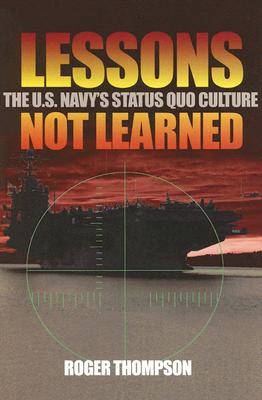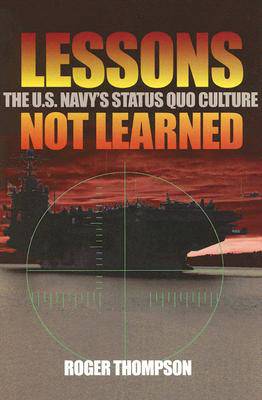
Door een staking bij bpost kan je online bestelling op dit moment iets langer onderweg zijn dan voorzien. Dringend iets nodig? Onze winkels ontvangen jou met open armen!
- Afhalen na 1 uur in een winkel met voorraad
- Gratis thuislevering in België vanaf € 30
- Ruim aanbod met 7 miljoen producten
Door een staking bij bpost kan je online bestelling op dit moment iets langer onderweg zijn dan voorzien. Dringend iets nodig? Onze winkels ontvangen jou met open armen!
- Afhalen na 1 uur in een winkel met voorraad
- Gratis thuislevering in België vanaf € 30
- Ruim aanbod met 7 miljoen producten
Zoeken
€ 41,45
+ 82 punten
Omschrijving
Despite its reputation as the most impressive naval force in the world, the U.S. Navy is in trouble, according to the author of this book, and systemic weaknesses could be its undoing. Here, military sociologist Roger Thompson provides a compelling, often scathing, assessment of the U.S. Navy and its learning disabilities and then presents a convincing argument for reform. Thompson points to the U.S. Navy's up or out promotion system, massive personnel turnover, inexperienced crews, and drug and alcohol abuse as problems that make it difficult for the Navy to build cohesive, well-trained fighting units. In a review of the Navy's recent history, he finds that its ships, submarines, and aircraft are often outperformed in competitions and exercises with other navies-and its failures are either denied altogether or perfunctorily excused. Diesel submarines-so quiet that they are rarely detected until it's too late to prevent an attack-routinely surpass expensive U.S. nuclear subs and put U.S. aircraft carriers in danger. American naval pilots, whose weapons are often improperly tested, are frequently bested by military pilots from other countries. Because the U.S. Navy doesn't have enough surface ships to protect its capital ships, American carrier strike groups now use Canadian ships as escorts. Shortcomings like these, Thompson argues, undermine the Navy's potential and should be cause for national concern. In presenting a side of the U.S. Navy that's rarely discussed, this book spells out lessons the Navy must learn if it is going to succeed in an era of asymmetrical warfare-of David-versus-Goliath conflicts. In his conclusion, the author puts forth a twelve-step program that calls on the U.S. Navy to rethink its naval strategy, to lose some weight, and to focus on the fundamentals.
Specificaties
Betrokkenen
- Auteur(s):
- Uitgeverij:
Inhoud
- Aantal bladzijden:
- 272
- Taal:
- Engels
Eigenschappen
- Productcode (EAN):
- 9781591148654
- Verschijningsdatum:
- 10/07/2013
- Uitvoering:
- Hardcover
- Formaat:
- Genaaid
- Afmetingen:
- 155 mm x 231 mm
- Gewicht:
- 498 g

Alleen bij Standaard Boekhandel
+ 82 punten op je klantenkaart van Standaard Boekhandel
Beoordelingen
We publiceren alleen reviews die voldoen aan de voorwaarden voor reviews. Bekijk onze voorwaarden voor reviews.











